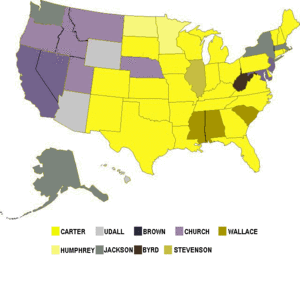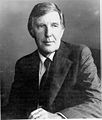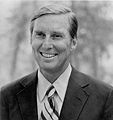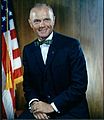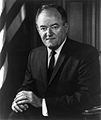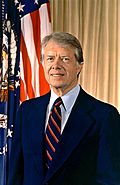- Democratic Party (United States) presidential primaries, 1976
-
Democratic Presidential Primaries, 1976 
1972 ← 1976 → 1980 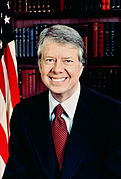

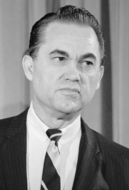
Nominee Jimmy Carter Jerry Brown George Wallace Party Democratic Democratic Democratic Home state Georgia California Alabama States carried 27 5 3 Popular vote 6,971,770 2,449,374 2,236,186 Percentage 40.16% 13.98% 12.75% 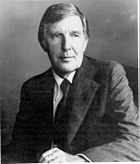
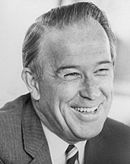
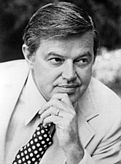
Nominee Mo Udall Henry M. Jackson Frank Church Party Democratic Democratic Democratic Home state Arizona Washington Idaho States carried 3 4 5 Popular vote 1,611,754 1,134,375 830,818 Percentage 9.16% 6.32% 4.77% 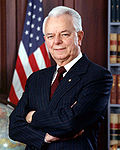
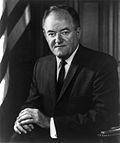
Nominee Robert Byrd Hubert Humphrey Party Democratic Democratic Home state West Virginia Minnesota States carried 1 2 Popular vote 340,309 61,992 Percentage 2.14% 0.39%
Statewide contest by winner
Democratic presidential candidate before election
Democratic presidential candidate-elect
The 1976 Democratic presidential primaries were the selection process by which voters of the Democratic Party chose its nominee for President of the United States in the 1976 U.S. presidential election. Former Governor of Georgia Jimmy Carter was selected as the nominee through a series of primary elections and caucuses culminating in the 1976 Democratic National Convention held from July 12 to July 15, 1976 in New York City.
Contents
Primary race
Due to the absence of any clear front-runner for the nomination, a record number of Democrats competed for their party's presidential nomination in 1976. Most of these candidates would drop out early in the race.
The 1976 campaign featured a record number of state primaries and caucuses, and it was the first presidential campaign in which the primary system was dominant. However, most of the Democratic candidates failed to realize the significance of the increased number of primaries, or the importance of creating momentum by winning the early contests. The one candidate who did see the opportunities in the new nominating system was Jimmy Carter, a former state senator and Governor of Georgia. Carter, who was virtually unknown at the national level, would never have gotten the Democratic nomination under the old, boss-dominated nominating system, but given the public disgust with political corruption following Richard Nixon's resignation, Carter realized that his obscurity and "fresh face" could be an asset in the primaries. Carter's plan was to run in all of the primaries and caucuses, beginning with the Iowa caucus, and build up momentum by winning "somewhere" each time primary elections were held. Carter startled many political experts by finishing second in the Iowa caucuses (where he came in second to "uncommitted"). Carter then won the New Hampshire primary, thus proving that a Southerner could win in the North. He then proceeded to slowly but steadily accumulate delegates in primaries around the nation. He also knocked his key rivals out of the race one by one. He defeated George Wallace in the North Carolina primary, thus eliminating his main rival in the South. He defeated Senator Henry "Scoop" Jackson in Pennsylvania, thus forcing Jackson to quit the race. In the Wisconsin primary Carter scored an impressive come-from-behind victory over Arizona Congressman Morris Udall, thus eliminating Udall as a serious contender. As Carter closed in on the nomination, an "ABC" (Anybody But Carter) movement started among Northern and Western liberal Democrats who worried that Carter's Southern upbringing would make him too conservative for the Democratic Party. The leaders of the "ABC" movement - Idaho Senator Frank Church and California Governor Jerry Brown - both announced their candidacies for the Democratic nomination and defeated Carter in several late primaries. However, their campaigns both started too late to prevent Carter from gathering the remaining delegates he needed to capture the nomination.
Democratic Party nomination
Nominee
-
Former Governor Jimmy Carter of Georgia
Withdrew during convention
-
Representative Morris Udall of Arizona
Withdrew during primaries
-
Senator Birch Bayh of Indiana
-
Senator Lloyd Bentsen of Texas
-
Senator Robert Byrd of West Virginia
-
Senator Frank Church of Idaho
-
Delegate Walter Fauntroy of Washington, D.C.
-
Former Senator Fred Harris of Oklahoma
-
Senator Henry M. Jackson of Washington
-
Governor Milton Shapp of Pennsylvania
-
Former Ambassador to France Sargent Shriver of Maryland
-
Mayor Walter Washington of Washington, D.C.
Withdrew before primaries
-
Former Governor Terry Sanford of North Carolina
-
Senator Walter Mondale of Minnesota
Declined to run
-
Governor Reubin Askew of Florida
-
Senator Dale Bumpers of Arkansas
-
Senator John Glenn of Ohio
-
Senator Hubert Humphrey of Minnesota
-
Prosecutor Leon Jaworski of Texas
-
Representative Barbara Jordan of Texas
-
Senator Ted Kennedy of Massachusetts
-
Former Senator Eugene McCarthy of Minnesota
-
Senator George McGovern of South Dakota
-
Senator Edmund Muskie of Maine
-
Senator Jennings Randolph of West Virginia
-
Mayor Kevin White of Massachusetts
Primaries
Scoop Jackson raised his national profile by speaking out on Soviet-U.S. relations and Middle East policy regularly, and was considered a front-runner for the nomination when he announced the start of his campaign in February 1975. Jackson received substantial financial support from Jewish-Americans who admired his pro-Israel views, but Jackson's support of the Vietnam War resulted in hostility from the left wing of the Democratic Party.
Jackson chose to run on social issues, emphasizing law and order and his opposition to busing. Jackson was also hoping for support from labor, but the possibility that Hubert Humphrey might enter the race caused unions to offer only lukewarm support.[1][2][3][4]
Jackson made the fateful decision not to compete in the early Iowa caucus and New Hampshire primary, which Carter won after liberals split their votes among four other candidates. Though Jackson won the Massachusetts and New York primaries, he dropped out on May 1 after losing the critical Pennsylvania primary to Carter by 12 points and running out of money.[1][2][3][4]
Statewide contest by winner
Results by state[5]:
Jimmy Carter Jerry Brown George Wallace Mo Udall Scoop Jackson Frank Church Lloyd Bentsen Robert Byrd Sargent Shriver Fred Harris Ellen McCormack Milton Shapp Birch Bayh January 27 Iowa 28% 0% 0% 6% 1% 0% 0% 0% 3% 10% 0% 0% 13% February 24 New Hampshire 28% 0% 1% 23% 2% 0% 0% 0% 8% 11% 1% 0% 15% March 2 Massachusetts 14% 0% 17% 18% 22% 0% 0% 0% 4% 7% 8% 3% 5% March 2 Vermont 42% 0% 0% 0% 0% 0% 0% 0% 28% 13% 9% 0% 0% March 9 Florida 35% 0% 31% 2% 24% 0% 0% 0% 1% 0% 1% 2% 1% March 16 Illinois 48% 0% 28% 0% 0% 0% 0% 0% 16% 8% 0% 0% 0% March 23 North Carolina 54% 0% 35% 2% 4% 0% 0% 0% 0% 1% 0% 0% 0% April 6 Wisconsin 37% 0% 13% 36% 6% 0% 0% 0% 1% 1% 4% 0% 0% April 27 Pennsylvania 37% 0% 11% 19% 25% 0% 0% 0% 0% 1% 3% 2% 1% May 1 Texas 48% 0% 18% 0% 0% 0% 22% 0% 0% 2% 2% 0% 0% May 4 Georgia 83% 11% 2% 1% 0% 1% 0% 0% 0% 0% 0% 0% 0% May 4 Indiana 68% 0% 15% 0% 12% 0% 0% 0% 0% 0% 5% 0% 0% May 4 Washington, D.C. 32% 0% 0% 21% 0% 0% 0% 0% 0% 1% 0% 0% 0% May 11 Connecticut 33% 0% 0% 31% 18% 0% 0% 0% 0% 0% 0% 0% 0% May 11 Nebraska 38% 0% 3% 3% 2% 38% 0% 0% 0% 0% 3% 0% 0% May 11 West Virginia 0% 0% 11% 0% 0% 0% 0% 89% 0% 0% 0% 0% 0% May 18 Maryland 37% 48% 4% 6% 2% 0% 0% 0% 0% 1% 1% 0% 0% May 18 Michigan 43% 0% 7% 43% 1% 0% 0% 0% 1% 1% 1% 0% 0% May 25 Arkansas 63% 0% 17% 8% 2% 0% 0% 0% 0% 0% 0% 0% 0% May 25 Idaho 12% 2% 2% 1% 1% 79% 0% 0% 0% 0% 1% 0% 0% May 25 Kentucky 59% 0% 17% 11% 3% 0% 0% 0% 0% 0% 6% 0% 0% May 25 Nevada 23% 53% 3% 3% 3% 9% 0% 0% 0% 0% 0% 0% 0% May 25 Oregon 27% 25% 1% 3% 1% 34% 0% 0% 0% 0% 1% 0% 0% May 25 Tennessee 77% 0% 11% 4% 2% 2% 0% 0% 0% 1% 1% 0% 0% June 1 Montana 25% 3% 0% 6% 3% 59% 0% 0% 0% 0% 0% 0% 0% June 1 Rhode Island 30% 0% 1% 4% 1% 27% 0% 0% 0% 0% 4% 0% 0% June 1 South Dakota 41% 0% 2% 33% 1% 0% 0% 0% 0% 1% 8% 0% 0% June 8 California 20% 59% 3% 5% 1% 7% 0% 0% 1% 0% 1% 0% 0% June 8 New Jersey 58% 0% 9% 0% 9% 14% 0% 0% 6% 0% 0% 0% 0% June 8 Ohio 52% 0% 6% 21% 3% 14% 0% 0% 0% 0% 0% 0% 0% Total popular vote
Total popular vote in primaries[6]
- Jimmy Carter - 6,971,770 (40.16%)
- Jerry Brown - 2,449,374 (13.98%)
- George Wallace - 2,236,186 (12.75%)
- Mo Udall - 1,611,754 (9.16%)
- Henry M. Jackson - 1,134,375 (6.32%)
- Frank Church - 830,818 (4.77%)
- Unpledged - 412,915 (2.37%)
- Lloyd Bentsen - 347,078 (1.99%)
- Robert Byrd - 340,309 (1.95%)
- Sargent Shriver - 332,919 (1.91%)
- Fred R. Harris - 265,947 (1.52%)
- Ellen McCormack - 243,727 (1.40%)
- Milton Shapp - 88,254 (0.50%)
- Birch Bayh - 86,438 (0.49%)
- Hubert Humphrey - 61,992 (0.35%)
- Others - 32,380 (0.18%)
- Ted Kennedy - 19,805 (0.12%)
- Walter Fauntroy - 10,149 (0.05%)
- Walter Washington - 5,161 (0.03%)
- Terry Sanford - 404 (0.00%)
Democratic National Convention
The 1976 Democratic National Convention was held in New York City. By the time the convention opened Carter already had more than enough delegates to win the nomination, and so the major emphasis at the convention was to create an appearance of party unity, which had been lacking in the 1968 and 1972 Democratic Conventions. Carter easily won the nomination on the first ballot; he then chose Senator Walter Mondale of Minnesota, a liberal and a protege of Hubert Humphrey, as his running mate.
The tally at the convention was[7]:
- Jimmy Carter - 2,239 (74.48%)
- Mo Udall - 330 (10.98%)
- Jerry Brown - 301 (10.01%)
- George Wallace - 57 (1.90%)
- Ellen McCormack - 22 (0.73%)
- Frank Church - 19 (0.63%)
- Hubert Humphrey - 10 (0.33%)
- Henry M. Jackson - 10 (0.33%)
- Fred R. Harris - 9 (0.30%)
- Milton Shapp - 2 (0.07%)
- Robert Byrd, Cesar Chavez, Leon Jaworski, Barbara Jordan, Ted Kennedy, Jennings Randolph, Fred Stover - each 1 vote (0.03%)
Vice-Presidential nomination
-
Senator Walter F. Mondale of Minnesota
-
Senator Edmund S. Muskie of Maine
-
Senator Frank Church of Idaho
-
Senator John Glenn of Ohio
-
Senator Adlai Stevenson III of Illinois
-
Senator Henry M. Jackson of Washington
By June, Carter had the nomination sufficiently locked up and could take time to interview potential vice-presidential candidates.
The pundits predicted that Frank Church would be tapped to provide balance as an experienced senator with strong liberal credentials. Church promoted himself, persuading friends to intervene with Carter in his behalf. If a quick choice had been required as in past conventions, Carter later recalled, he would probably have chosen Church. But the longer period for deliberation gave Carter time to worry about his compatibility with the publicity-seeking Church, who had a tendency to be long-winded. Instead, Carter invited Senators Edmund Muskie, John Glenn, and Walter Mondale to visit his home in Plains, Georgia, for personal interviews, while Church, Henry M. Jackson, and Adlai Stevenson III would be interviewed at the convention in New York. Of all the potential candidates, Carter found Mondale the most compatible. As a result, Carter selected Mondale as his running mate.
The vice presidential tally, in part, was:
- Walter Mondale 2837
- House Speaker Carl Albert 36
- Ronald Dellums 20
- Fritz Efaw 12
- Barbara Jordan 17
- Others 53
See also
References
- ^ a b Oldham, Kit (August 19, 2003). "Jackson, Henry M. "Scoop"". HistoryLink.org. http://www.historylink.org/essays/output.cfm?file_id=5516.
- ^ a b David Wilma and Kit Oldham (November 7, 2003). "State voters elect Dixy Lee Ray as first woman governor of Washington, re-elect Senator Henry Jackson and House incumbents, and prefer Ford to Carter on November 2, 1976.". HistoryLink.org. http://www.washington.historylink.org/output.cfm?file_id=5611.
- ^ a b Salam, Reihan (May 27, 2003). "Double Scoop". The New Republic Online. http://www.tnr.com/doc.mhtml?i=express&s=salam052703.
- ^ a b "Jimmy Carter's Big Breakthrough". Time Magazine. May 10, 1976. http://cgi.cnn.com/ALLPOLITICS/1996/analysis/back.time/9605/10/.
- ^ Elections
- ^ Our Campaigns - US President - D Primaries Race - Feb 01, 1976
- ^ Our Campaigns - US President - D Convention Race - Jul 12, 1976
United States presidential election, 1976 Democratic Party
Convention · PrimariesNominee: Jimmy Carter
VP Nominee: Walter Mondale
Candidates: Birch Bayh · Lloyd Bentsen · Jerry Brown · Robert Byrd · Hugh Carey · Frank Church · Fred R. Harris · Hubert Humphrey · Henry M. Jackson · Leon Jaworski · Barbara Jordan · Eugene McCarthy · Ellen McCormack · Walter Mondale · Jennings Randolph · Terry Sanford · Milton Shapp · Sargent Shriver · Adlai Stevenson III · Mo Udall · George WallaceRepublican Party
Convention · PrimariesNominee: Gerald Ford
VP Nominee: Bob Dole
Candidiates: James L. Buckley · Ronald Reagan · Harold StassenThird party and independent candidates American Party American Independent Party Communist Party USA Libertarian Party People's Party Prohibition Party Socialist Workers Party U.S. Labor Party Other 1976 elections: House · Senate · Gubernatorial United States presidential primaries Election timelines National polling State polling Fundraising 2008Debates Straw polls Major Events Caucuses
and primariesResults breakdown National
conventionsDemocratic Party: 1900 · 1904 · 1908 · 1912 · 1916 · 1920 · 1924 · 1928 · 1932 · 1936 · 1940 · 1944 · 1948 · 1952 · 1956 · 1960 · 1964 · 1968 · 1972 · 1976 · 1980 · 1984 · 1988 · 1992 · 1996 · 2000 · 2004 · 2008 · 2012
Republican Party: 1900 · 1904 · 1908 · 1912 · 1916 · 1920 · 1924 · 1928 · 1932 · 1936 · 1940 · 1944 · 1948 · 1952 · 1956 · 1960 · 1964 · 1968 · 1972 · 1976 · 1980 · 1984 · 1988 · 1992 · 1996 · 2000 · 2004 · 2008 · 2012Reforms Jimmy Carter October 1, 1924 Presidency Presidency of Jimmy Carter · Camp David Accords · Torrijos-Carter Treaties · National Energy Policy · Iran hostage crisis · Operation Eagle Claw · 1979 energy crisis · SALT · Department of Energy · Department of Education · Department of Health and Human Services · Executive Order 12148 · Executive Order 12170Elections Electoral history · 1966 gubernatorial election · 1970 gubernatorial election · 1976 presidential primaries · 1976 presidential election · 1980 presidential primaries · 1980 presidential electionPost-Presidency and other activities Family Rosalyn Carter (wife) · Jack Carter (son) · Amy Carter (daughter) · Lillian Gordy Carter (mother) · Jason Carter (grandson)Books (Complete list) · Palestine: Peace Not Apartheid · We Can Have Peace in the Holy Land · White House DiaryAwards and honors Electoral histories of the American Presidents Abraham Lincoln · Theodore Roosevelt · Herbert Hoover · Franklin D. Roosevelt · Harry S. Truman · John F. Kennedy · Lyndon B. Johnson · Richard Nixon · Gerald Ford · Jimmy Carter · Ronald Reagan · George H. W. Bush · Bill Clinton · George W. Bush · Barack Obama Categories:
Categories:- 1976 in the United States
- Democratic Party (United States) presidential primaries
- United States presidential primaries, 1976
-
Wikimedia Foundation. 2010.

